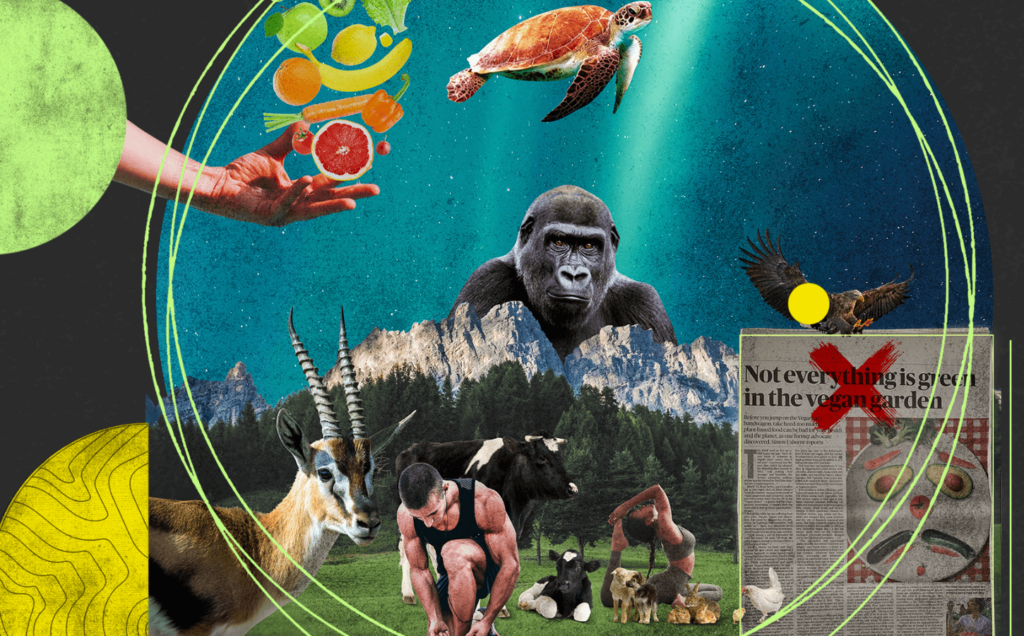Veganism is more than just a dietary choice—it represents a profound ethical and moral commitment to reducing harm and fostering compassion for all sentient beings, especially animals. At its core, veganism challenges the long-standing human tendency to exploit animals for food, clothing, entertainment, and other purposes. Instead, it advocates for a lifestyle that acknowledges the inherent value of animals, not as commodities, but as living beings capable of experiencing pain, joy, and a wide range of emotions. By adopting veganism, individuals not only make personal ethical decisions but also actively work toward a compassionate connection with animals, reshaping the way society interacts with the animal kingdom.
Seeing Animals as Individuals
One of the most profound impacts of veganism is the shift it creates in how people perceive animals. In societies where animals are often commodified for their meat, leather, fur, or other byproducts, animals are typically seen through a utilitarian lens—as resources to be used for human gain. However, veganism encourages individuals to look beyond this superficial view and see animals as individuals with their own unique personalities, desires, and emotional experiences. By adopting a plant-based lifestyle, people begin to recognize that animals are sentient beings, much like humans, who can feel pain, fear, and happiness.

This deeper understanding fosters a compassionate connection between humans and animals, as it encourages people to empathize with the experiences of animals and question their treatment. For instance, the realization that animals such as pigs, cows, and chickens are capable of forming complex social bonds and experiencing a range of emotions—similar to those of humans—compels individuals to reconsider their role in contributing to the suffering of these creatures. Veganism, therefore, helps bridge the emotional gap between human beings and animals, promoting a more compassionate worldview where animals are seen not as commodities, but as fellow sentient beings deserving of respect and consideration.
The Emotional Awakening
Transitioning to a vegan lifestyle often involves an emotional awakening, where individuals begin to truly understand the extent of the suffering inflicted on animals in various industries. From factory farming, where animals are confined in appallingly cruel conditions, to the entertainment industry, where animals are forced to perform or endure mistreatment, the exploitation of animals is widespread and largely hidden from public view. Veganism brings this hidden suffering into the light, encouraging individuals to confront the harsh realities of animal exploitation and reflect on how their choices impact other living beings.
As people learn more about the cruelty involved in animal-based industries, they often experience a deep sense of empathy for animals, which strengthens their emotional connection to them. This emotional transformation is one of the most powerful aspects of veganism, as it compels individuals to reconsider their behavior and take responsibility for the suffering they may have unknowingly caused in the past. This awakening deepens compassion, and as individuals adopt veganism, they foster a new sense of responsibility toward all living beings.

Ethical Decision-Making and Personal Responsibility
Veganism is inherently ethical, rooted in a deep respect for the autonomy and dignity of animals. One of the central tenets of veganism is the rejection of practices that cause harm to animals, such as factory farming, animal testing, and the use of animal products for clothing or cosmetics. By choosing a vegan lifestyle, individuals actively choose to distance themselves from industries that exploit animals for human gain, making a statement that compassion and empathy are more important than convenience or tradition.
The ethical principles behind veganism also encourage individuals to think critically about the larger systems of exploitation that perpetuate animal suffering. It’s not just about making ethical choices on a personal level but about understanding the impact of these choices on a global scale. For example, factory farming practices contribute to environmental destruction, health problems, and the mistreatment of billions of animals worldwide. By choosing to live in alignment with their values—values that prioritize kindness, justice, and respect—vegans stand against the systemic abuse of animals. This ethical commitment enhances their connection to animals by creating a framework for living in harmony with other sentient beings, ensuring that every decision made reflects a genuine concern for their well-being.
Promoting Animal Rights and Cultural Change
Beyond individual choices, veganism also plays a crucial role in advancing the movement for animal rights. As more people embrace veganism and share their reasons for doing so, they help raise awareness about the importance of animal welfare and challenge societal norms that have long accepted animal exploitation as a given. This ripple effect creates a broader cultural shift, where compassion for animals becomes a value that is celebrated and respected.
By supporting veganism, individuals contribute to a society where animal rights are increasingly recognized and protected. This cultural change is vital in transforming how society interacts with animals, encouraging more ethical treatment across industries and in day-to-day life. Whether through grassroots activism, social media advocacy, or supporting businesses that align with vegan principles, the collective impact of individuals adopting veganism can lead to a world where animals are not viewed as tools for human use but as beings with intrinsic value and rights.

Environmental Sustainability and Compassionate Connections
An often-overlooked aspect of veganism is its profound connection to environmental sustainability, which, in turn, strengthens the compassionate bond between humans and animals. The meat and dairy industries are some of the largest contributors to environmental destruction, from deforestation and habitat loss to greenhouse gas emissions and water pollution. The agricultural practices that support factory farming have devastating consequences for wildlife and entire ecosystems. By choosing veganism, individuals reduce their environmental footprint, helping protect the habitats of countless animal species that are threatened by climate change and industrial agriculture.
The environmental benefits of veganism also have a direct connection to the well-being of animals, as reducing the demand for animal products lessens the pressure on the planet’s natural resources and allows ecosystems to thrive. For example, a shift away from meat production can help preserve the habitats of endangered species, ensuring that animals in the wild are not displaced or harmed due to industrial farming practices. In this way, veganism promotes a holistic vision of compassion—one that extends not only to domesticated animals but also to wildlife and the natural world.
Conclusion: A Compassionate World for All
Veganism strengthens compassionate connections with animals by encouraging individuals to view them as sentient beings deserving of respect, empathy, and ethical consideration. By fostering emotional awareness, making ethical decisions, and contributing to a larger cultural shift toward animal rights, veganism helps create a world where animals are treated with dignity and kindness. This lifestyle not only transforms the way we interact with animals but also promotes environmental sustainability and social justice, recognizing the interconnectedness of all life on Earth. Through veganism, we can build a compassionate world where every living being is valued, and where our actions reflect a deep commitment to reducing harm and promoting peace.















































